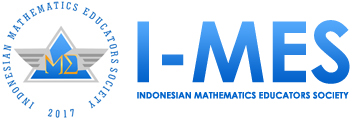Tinjauan Self-Efficacy Siswa pada Model Pembelajaran Missouri Mathematics Project terhadap Kemampuan Komunikasi Matematis
DOI:
https://doi.org/10.35706/sjme.v8i1.10433Abstract
This study aims to see the effect of Missouri Mathematics Project learning model on students' mathematical communication ability in terms of students' mathematical self-efficacy. This research is a quasi-experimental. The population in this study were all grade X students in one of the public high schools in Surakarta city in 2023. The sample in this study was taken by cluster random sampling consisting of two classes, namely the experimental class that received the Missouri Mathematics Project learning model and the control class that received the Problem-Based Learning model. Data collection techniques through questionnaires to obtain data on student self-efficacy and student mathematical communication ability tests to obtain data on students' mathematical communication ability. Data analysis technique used two-way ANOVA with unequal cells. The results showed that the mathematical communication ability of students who were given the Missouri Mathematics Project learning model were better than students who were given the Problem-Based Learning model, both in general and in terms of student self-efficacy, both high, medium, and low. In the aspect of self-efficacy, both in general and in each learning model, high self-efficacy has the same good mathematical communication ability as moderate self-efficacy, high self-efficacy students have better mathematical communication ability than students with low self-efficacy, and moderate self-efficacy students have better mathematical communication ability.
Downloads
References
Afrianti, R. E. N., & Qohar, A. (2020). Improving Student’s Mathematical Communication Abilitythrough Think Talk Write Learning Model on Geometry Materials. JIPM (Jurnal Ilmiah Pendidikan Matematika), 8(2), 65–75. https://doi.org/10.25273/jipm.v8i2.6184
Agung, P., & Sutji, M. (2022). Rancangan Pembelajaran Berkarakteristik dan Inovatif Abad 21 pada Materi Gelombang dengan Model Pembelajaran Discovery Learning di SMKN 1 Dukuhturi. Cakrawala: Jurnal Pendidikan, 214–221. https://doi.org/10.24905/cakrawala.vi0.178
Astiwijaya, N. (2020). Meningkatkan Kemampuan Komunikasi Matematis Siswa Dengan Implementasi Model Pembelajaran Missouri Mathematics Project (MMP). Jurnal Pendidikan Matematika: Judika Education, 3(1), 8–16. https://doi.org/10.31539/judika.v3i1.1179
Budiyono. (2016). Statistika untuk Penelitian (2nd ed.). UNS Pres.
Budiyono. (2017). Pengantar Metodologi Penelitian Pendidikan. UNS Press.
Fahlevi, M. R. (2022). Kajian Project Based Blended Learning Sebagai Model Pembelajaran Pasca Pandemi dan Bentuk Implementasi Kurikulum Merdeka. Sustainable Jurnal Kajian Mutu Pendidikan, 5(2), 230–249. https://doi.org/10.32923/kjmp.v5i2.2714
Fatmawati, K. E., Sutopo, & Fitriana, L. (2019). Eksperimentasi Model Missouri Mathematics Project (MMP) dengan Pendekatan Open-Ended Pada Materi Teorema Phytagoras Ditinjau dari Kemampuan Penalaran Siswa Kelas VII SMP Negeri 3 Mojosongo. Jurnal Pendidikan Matematika Dan Matematika (JPMM), 3(4), 401–409. https://jurnal.uns.ac.id/JMMS/article/view/37696
Gibson, J. L. (2010). Organizations Behavior, Structure, Processes. McGraw-Hill, Inc.
Glava, C., & Baciu, C. (2015). Premises of the Educational Implementation of Information and Communication Technologies. Procedia - Social and Behavioral Sciences, 209, 3–8. https://doi.org/10.1016/j.sbspro.2015.11.206
Hanisah, H., & Noordyana, M. A. (2022). Kemampuan Komunikasi Matematis Siswa pada Materi Penyajian Data di Desa Bojong. Plusminus: Jurnal Pendidikan Matematika, 2(1), 131–140.
Hati, R., Sapri, J., & Wasidi, W. (2019). THE EFFECT OF MISSOURI MATHEMATICS PROJECT LEARNING MODEL AND SELF REGULATED LEARNING TOWARD STUDENT ACHIEVEMENT. Diadik: Jurnal Ilmiah Teknologi Pendidikan, 8(1), 34–47. https://doi.org/10.33369/diadik.v8i1.7197
Hendriana, H., & Kadarisma, G. (2019). Self-Efficacy dan Kemampuan Komunikasi Matematis Siswa SMP. JNPM (Jurnal Nasional Pendidikan Matematika), 3(1), 153–164. https://doi.org/10.33603/jnpm.v3i1.2033
Hendriana, H., Rohaeti, E. E., & Hidayat, W. (2017). Metaphorical Thinking Learning and Junior High School Teachers’ Mathematical Questioning Ability. Journal on Mathematics Education, 8(1), 55–64. https://doi.org/10.22342/jme.8.1.3614.55-64
Hendriana, H., & Soemarmo, U. (2016). Penilaian Pembelajaran Matematika. PT. Refika Aditama.
Hodiyanto, H. (2017). Kemampuan Komunikasi Matematis dalam Pembelajaran Matematika. AdMathEdu, 7(1), 9–18. https://doi.org/10.12928/admathedu.v7i1.7397
Kamid, Rusdi, M., Fitaloka, O., Basuki, F. R., & Anwar, K. (2020). Mathematical communication skills based on cognitive styles and gender. Journal of Evaluation and Research in Education (IJERE), 9(4), 847–856. https://doi.org/10.11591/ijere.v9i4.20497
Klochkova, O., Komochkina, E., & Mustafina, A. (2016). “Triad” Strategy as an Effective Way of Developing Professional Communication Skills of Physics and Mathematics Students. Procedia - Social and Behavioral Sciences, 236, 271–276. https://doi.org/10.1016/j.sbspro.2016.12.028
Lianto, L. (2019). Self-efficacy: A Brief Literature Review. Jurnal Manajemen Motivasi, 15(2), 55–61. https://doi.org/10.29406/jmm.v15i2.1409
Lomibao, L. S., Luna, C. A., & Namoco, R. A. (2016). The Influence of Mathematical Communication on Students’ Mathematics Performance and Anxiety. American Journal of Educational Research, 4(5), 378–382. https://doi.org/10.24042/ijsme.v5i2.12809
Marniati, M., Jahring, J., & Jumriani, J. (2021). Analisis Kemampuan Komunikasi Matematis Siswa Dalam Memecahkan Masalah Berdasarkan Motivasi Belajar Siswa. AKSIOMA: Jurnal Program Studi Pendidikan Matematika, 10(2), 880–890. https://doi.org/10.24127/ajpm.v10i2.3523
NCTM. (2000). Principles and Standards for School Mathematics. National Council of Teachers of Mathematics.
Panadero, E., Jonsson, A., & Botella, J. (2017). Effects of Self-Assessment on Self-Regulated Learning and Self-Efficacy: Four Meta-Analyses. Educational Research Review, 22(1), 74–98. https://doi.org/10.1016/j.edurev.2017.08.004
Pugalee, K. D. (2001). Using Communication to Develop Students Mathematical Literacy. Mathematics Teaching in The Middle School, 6(5), 296–299. https://doi.org/10.5951/MTMS.6.5.0296
Randa, M., Maimunah, M., & Yuanita, P. (2020). Pengembangan Perangkat Pembelajaran Matematika Menggunakan Pendekatan Recipcoral Teaching untuk Memfasilitasi Kemampuan Komunikasi Matematis Siswa SMP. Jurnal Cendekia: Jurnal Pendidikan Matematika, 4(2), 1197–1206. https://doi.org/10.31004/cendekia.v4i2.352
Rina, M., & Sitti, H. M. (2015). Hubungan Antara Self-Efficacy Dengan Kemampuan Komunikasi Matematik Pada Siswa SMPN 2 Padang Panjang. Psyche 165 Journal, 8(2), 14–28.
Rohid, N., Suryaman, & Rusmawati, R. D. (2019). Students’ Mathematical Communication Skills (MCS) in Solving Mathematics Problems: A Case in Indonesian Context. Anatolian Journal of Education, 4(2), 19–30. https://doi.org/10.29333/aje.2019.423a
Sihaloho, L. (2018). Pengaruh Efikasi Diri (Self Efficacy) Terhadap Hasil Belajar Ekonomi Siswa Kelas XI IPS SMA Negeri Se-Kota Bandung. JINoP (Jurnal Inovasi Pembelajaran), 4(1), 62–70. https://doi.org/10.22219/jinop.v4i1.5671
Sritresna, T. (2017). Meningkatkan Kemampuan Komunikasi Matematis Dan Self-Confidence Siswa Melalui Model Pembelajaran Cycle 7E. Mosharafa: Jurnal Pendidikan Matematika, 6(3), 419–430.
Tiffany, F., Surya, E., Panjaitan, A., & Syahputra, E. (2017). Analysis Mathematical Communication Skills Student at The Grade IX Junior High School. International Journal Of Advance Research And Innovative Ideas In Education, 3(2), 2160–2164.
Viki, V. F., & Handayani, I. (2020). Kemampuan Komunikasi Matematis Berdasarkan Self-Efficacy. Transformasi: Jurnal Pendidikan Matematika Dan Matematika, 4(1), 189–202. https://doi.org/10.36526/tr.v4i1.906
Wulandari, A. P., Cholily, Y. M., & Ummah, S. K. (2022). Development of Missouri Mathematics Project Learning Worksheet to Improve Mathematical Communication and Critical Thinking Skill. Jurnal Pendidikan MIPA, 23(1), 57–66. https://doi.org/10.23960/jpmipa/v23i1.pp57-66
Yamin, M., & Syahrir, S. (2020). Pembangunan pendidikan merdeka belajar (telaah metode pembelajaran). Jurnal Ilmiah Mandala Education, 6(1), 126–136. https://doi.org/10.58258/jime.v6i1.1121
Yerizon, Armiati, Tasman, F., & Abdullah, B. (2019). Development of StudentWorksheets Based on M-APOS Approach with Mind Mapping to Improve Mathematical Communication Ability of Grade VII Students of Middle School. International Journal of Scientific and Technology Research, 8(6), 352–356.
Zahrowiyah, S., Faradiba, S. S., & Alifiani, A. (2022). Kemampuan Komunıkasi Matematıs Tulis Pada Materi Bentuk Aljabar Ditinjau dari Self-Effıcacy Peserta Didik. Jurnal Cendekia: Jurnal Pendidikan Matematika, 6(2), 1995–2010. https://doi.org/10.31004/cendekia.v6i2.1433
Zulkarnain, I., Kusumawati, E., & Mawaddah, S. (2021). Mathematical communication skills of students in mathematics learning using discovery learning model. J. Phys.: Conf. Ser., 1760, 012045. https://doi.org/10.1088/1742-6596/1760/1/012045
Downloads
Published
How to Cite
Issue
Section
License

This work is licensed under a Creative Commons Attribution-ShareAlike 4.0 International License.
Authors who publish with this journal agree to the following terms:
- Authors retain copyright and grant the journal right of first publication with the work simultaneously licensed under a Creative Commons Attribution License that allows others to share the work with an acknowledgment of the work's authorship and initial publication in this journal.
- Authors are able to enter into separate, additional contractual arrangements for the non-exclusive distribution of the journal's published version of the work (e.g., post it to an institutional repository or publish it in a book), with an acknowledgment of its initial publication in this journal.
- Authors are permitted and encouraged to post their work online (e.g., in institutional repositories or on their website) prior to and during the submission process, as it can lead to productive exchanges, as well as earlier and greater citation of published work (See The Effect of Open Access).










